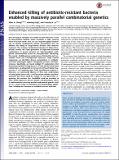| dc.contributor.author | Cheng, Allen A. | |
| dc.contributor.author | Ding, Huiming | |
| dc.contributor.author | Lu, Timothy K. | |
| dc.date.accessioned | 2015-03-03T19:29:59Z | |
| dc.date.available | 2015-03-03T19:29:59Z | |
| dc.date.issued | 2014-08 | |
| dc.date.submitted | 2014-01 | |
| dc.identifier.issn | 0027-8424 | |
| dc.identifier.issn | 1091-6490 | |
| dc.identifier.uri | http://hdl.handle.net/1721.1/95764 | |
| dc.description.abstract | New therapeutic strategies are needed to treat infections caused by drug-resistant bacteria, which constitute a major growing threat to human health. Here, we use a high-throughput technology to identify combinatorial genetic perturbations that can enhance the killing of drug-resistant bacteria with antibiotic treatment. This strategy, Combinatorial Genetics En Masse (CombiGEM), enables the rapid generation of high-order barcoded combinations of genetic elements for high-throughput multiplexed characterization based on next-generation sequencing. We created ~34,000 pairwise combinations of Escherichia coli transcription factor (TF) overexpression constructs. Using Illumina sequencing, we identified diverse perturbations in antibiotic-resistance phenotypes against carbapenem-resistant Enterobacteriaceae. Specifically, we found multiple TF combinations that potentiated antibiotic killing by up to 10[superscript 6]-fold and delivered these combinations via phagemids to increase the killing of highly drug-resistant E. coli harboring New Delhi metallo-beta-lactamase-1. Moreover, we constructed libraries of three-wise combinations of transcription factors with >4 million unique members and demonstrated that these could be tracked via next-generation sequencing. We envision that CombiGEM could be extended to other model organisms, disease models, and phenotypes, where it could accelerate massively parallel combinatorial genetics studies for a broad range of biomedical and biotechnology applications, including the treatment of antibiotic-resistant infections. | en_US |
| dc.description.sponsorship | National Institutes of Health (U.S.) (New Innovator Award DP2 OD008435) | en_US |
| dc.description.sponsorship | United States. Office of Naval Research | en_US |
| dc.description.sponsorship | Ellison Medical Foundation (New Scholar in Aging Award) | en_US |
| dc.description.sponsorship | Henry L. and Grace Doherty Charitable Foundation | en_US |
| dc.language.iso | en_US | |
| dc.publisher | National Academy of Sciences (U.S.) | en_US |
| dc.relation.isversionof | http://dx.doi.org/10.1073/pnas.1400093111 | en_US |
| dc.rights | Article is made available in accordance with the publisher's policy and may be subject to US copyright law. Please refer to the publisher's site for terms of use. | en_US |
| dc.source | National Academy of Sciences (U.S.) | en_US |
| dc.title | Enhanced killing of antibiotic-resistant bacteria enabled by massively parallel combinatorial genetics | en_US |
| dc.type | Article | en_US |
| dc.identifier.citation | Cheng, A. A., H. Ding, and T. K. Lu. “Enhanced Killing of Antibiotic-Resistant Bacteria Enabled by Massively Parallel Combinatorial Genetics.” Proceedings of the National Academy of Sciences 111, no. 34 (August 11, 2014): 12462–12467. | en_US |
| dc.contributor.department | Harvard University--MIT Division of Health Sciences and Technology | en_US |
| dc.contributor.department | Massachusetts Institute of Technology. Department of Biological Engineering | en_US |
| dc.contributor.department | Massachusetts Institute of Technology. Department of Electrical Engineering and Computer Science | en_US |
| dc.contributor.department | Massachusetts Institute of Technology. Research Laboratory of Electronics | en_US |
| dc.contributor.department | Massachusetts Institute of Technology. Synthetic Biology Center | en_US |
| dc.contributor.mitauthor | Ding, Huiming | en_US |
| dc.contributor.mitauthor | Lu, Timothy K. | en_US |
| dc.contributor.mitauthor | Cheng, Allen A. | en_US |
| dc.relation.journal | Proceedings of the National Academy of Sciences of the United States of America | en_US |
| dc.eprint.version | Final published version | en_US |
| dc.type.uri | http://purl.org/eprint/type/JournalArticle | en_US |
| eprint.status | http://purl.org/eprint/status/PeerReviewed | en_US |
| dspace.orderedauthors | Cheng, Allen A.; Ding, Huiming; Lu, Timothy K. | en_US |
| dc.identifier.orcid | https://orcid.org/0000-0002-9999-6690 | |
| mit.license | PUBLISHER_POLICY | en_US |
| mit.metadata.status | Complete | |

